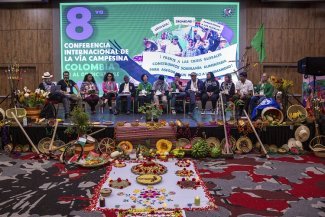Back in 1993, when Prime Minister Narendra Modi was just a provincial tyro and global warming had not yet entered the mainstream political and social lexicon, an environmental revolution was launched by a ground-breaking trade union in the western Indian city of Pune.
Led by women and focused on the empowerment of Dalit rubbish collectors and recyclers, the “lowest of the low” in India’s caste-ridden society, the revolution was initially given little credence.
But today India and its political establishment are finally beginning to wake up to the pioneering work of the KKPKP – the Kagad, Kach, Patra, Kashtakari Panchayat, meaning Paper, Glass and Tin Labourers Council.
Modi’s first political act after his landslide election victory in May last year was to launch the Swachh Bharat, or Clean India campaign.
Having smashed India’s post-independence Congress Party-dominated political consensus, perhaps Modi’s drive was as much symbolic as practical – a literal manifestation of the adage that “a new broom sweeps clean.”
Certainly it inspired an army of hundreds of thousands of broom-wielding Modiites to scour the country in the first months of his rule. But one city where their services were not required was the metropolis of Pune here in Maharashtra State, the birthplace of the KKPKP movement.
“We’ve got 11,000 union members here in Pune. We’ve got many brooms of our own. We didn’t need all these brooms coming in from Delhi,” chided Shailajah Aralkar, a union spokesperson and self-described KKPKP cadre.
“There are no leaders in this union,” said Shailajah, a fierce and determined 40-year-old. “Here we are all workers, cadres.”
The second largest city in the state of Maharashtra after Mumbai, Pune (pronounced Poonay) has a population of around eight million people.
Famed for its universities and ashrams (monastries) and once the citadel of the Peshwar dynasty, who ruled Maharashtra before conquest by the colonial British, Pune has an estimated 25,000 rag pickers or kabadi wallahs working in the refuse-related informal economy.
Today the union has 11,000 members. Ninety per cent of the membership is female, 95 per cent are from the Dalit castes and five per cent are Muslim. The union also has members who are toilet cleaners and tanners.
“This is union power at its very best”
The KKPKP was the first waste pickers’ union in India and the movement has now spread across the country with allied sister unions in Delhi, Mumbai, Chennai, Bengaluru, Bhopal, Indore and Patna, amongst other cities.
“This is an example of union power and organising at its very best,” Shailajah, speaking in English, told Equal Times. “Much of the exploitation has ended. People used to call us ’thief’. Now women have taken back their rights.”
One of the first campaigns launched by the KKPKP was to eradicate child labour amongst worker families.
“Initially there were a lot of children working. But if you see child workers now I’m damn sure they’re not our members’ children,” stressed Shailaja. “Children of our members were on the street so we started organising for their education. Now less and less children are not going to school.”
The union has successfully fought for the rights of members’ children to have free school meals, free notebooks and school textbooks. The union also offers members interest-free loans of 20,000 rupees (around US$300) to help pay for university or college fees.
In further union victories, by 1996 the KKPKP had pressured the Pune Municipal Corporation to issue all union members with official ID cards – a major factor in ending discriminatory treatment by police and the harassment of workers.
And in 2004 the city government finally agreed to pay the workers’ medical insurance premiums.
“Before we were treated as if we were nothing. But when we joined the union we started getting respect,” said 27-year-old rubbish collector Anil Shirsad.
“Before if we foraged in the rubbish containers the police even used to arrest us or harass us. Many times they would make us empty our bags to make sure we were not carrying anything else.
“They treated us like thieves even though we were providing an important service. Sometimes they forced us to pay them bribes,” Anil explained.
He and his wife Nita, 25, are amongst seven union members who work at the Ravi Raj Housing Society, a gated community in the Pune suburbs.
Thanks to the KKPKP, they have a proper fixed contract to service the 285 Ravi Raj apartments, collecting rubbish from each household six days a week (with Sundays off), composting organic waste for use in the communal gardens and sorting any remaining waste for recycling.
Each worker is paid 4,300 rupees (about US$68) a month and earns, on average, an additional 1,200 rupees (US$19) a month from recycling.
“We get paid on time on the eighth of every month,” said Nita with quiet satisfaction.
“I’d never done work like this before and at first I thought it was very dirty. But now I’ve got used to it and I’m happy with my work,” continued the former agricultural labourer.
“If anyone complains the supervisors intervene and resolve the problem. They protect our jobs. It’s very, very beneficial for us workers.”
(David Browne/Parachute Pictures)
Growing consumerism
Referring to the union, Sadthana Bhagwat, a committee member at the Ravi Raj Housing Society, said: “These people are important. They are educating people about the need and importance of recycling and segregating rubbish.
“More and more, the people of India are embracing consumerism and as a result there is more and more plastic waste.”
An hour’s bus ride across town, in the Pune suburb of Pimpri, KKPKP workers wait for their afternoon delivery.
A flow of small trucks pulled up at the ’scrap shop’, as the recycling centre is known.
Large plastic sacks of rubbish were pitched to the ground and the women workers moved in, sifting, sorting, stacking and segregating the detritus of modern ’Shining’ India.
Shailajah Aralkar was proud and pugnacious. “We are not asking the government to give us a job. We are self-employed. We are environmental workers. This is vital work,” she asserted.
“Everything you see here is re-cycled. All over India waste pickers save municipal corporations millions and millions of rupees. In Pune alone they save the corporation 16 crore rupees (US$2.5million) each year.
“We fight for everything under the sky,” she continued. “Whenever our members have issues the union is there. We are the most empowered.”
From rags the KKPKP has made trade union riches.









